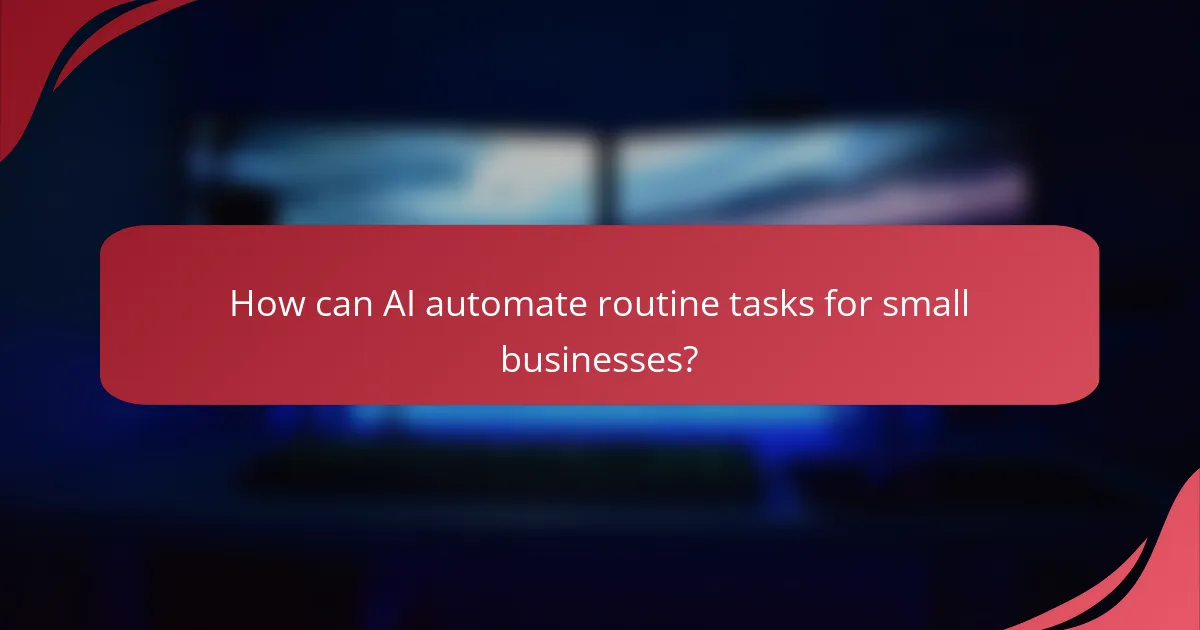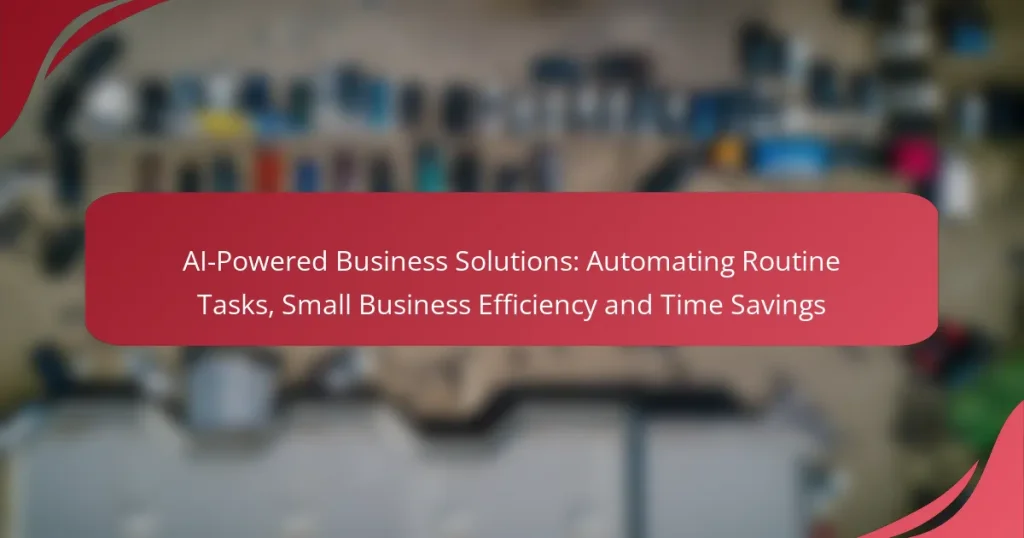AI-powered business solutions are transforming the landscape for small businesses by automating routine tasks and enhancing overall efficiency. By leveraging these technologies, small business owners can save valuable time and resources, enabling them to concentrate on growth and improving customer engagement. Tools like Zapier, QuickBooks, HubSpot, and Trello are designed to streamline processes, ultimately leading to better productivity and decision-making.

How can AI automate routine tasks for small businesses?
AI can significantly automate routine tasks for small businesses by streamlining processes, reducing manual effort, and increasing overall efficiency. By implementing AI-powered solutions, small businesses can save time and resources, allowing them to focus on growth and customer engagement.
Task automation tools
Task automation tools help small businesses eliminate repetitive tasks by using software to perform them automatically. These tools can handle various functions, such as data entry, email management, and reporting, freeing up employees to concentrate on more strategic activities. Popular options include Zapier and Integromat, which enable users to connect different applications and automate workflows.
When selecting a task automation tool, consider factors like ease of use, integration capabilities, and pricing. Many tools offer tiered pricing plans, allowing businesses to choose a solution that fits their budget and needs.
AI-driven scheduling software
AI-driven scheduling software simplifies the process of managing appointments and meetings by automatically finding suitable times for all participants. These tools analyze calendars and preferences to suggest optimal meeting slots, reducing the back-and-forth communication often associated with scheduling. Examples include Calendly and Doodle.
To maximize the benefits of scheduling software, ensure it integrates seamlessly with existing calendar systems and provides reminders to participants. This can help minimize no-shows and improve overall time management.
Chatbots for customer service
Chatbots can enhance customer service by providing instant responses to common inquiries, which helps reduce wait times and improve customer satisfaction. These AI-powered tools can handle tasks such as answering FAQs, processing orders, and guiding users through troubleshooting steps. Platforms like Intercom and Drift offer customizable chatbot solutions for small businesses.
Implementing chatbots requires careful consideration of the types of questions they will handle and the tone of communication. Regularly updating the chatbot’s knowledge base is essential to ensure it remains effective and relevant.
Document processing solutions
Document processing solutions utilize AI to automate the extraction and organization of data from various documents, such as invoices, receipts, and contracts. This technology can significantly reduce the time spent on manual data entry and improve accuracy. Tools like ABBYY FlexiCapture and DocuSign are popular choices for small businesses looking to streamline their document workflows.
When adopting document processing solutions, consider the types of documents your business handles most frequently and ensure the software can accommodate them. Training staff on how to use these tools effectively will also enhance their impact.
Inventory management systems
AI-powered inventory management systems help small businesses track stock levels, forecast demand, and optimize ordering processes. These systems can analyze sales data and trends to predict future inventory needs, reducing the risk of overstocking or stockouts. Solutions like TradeGecko and Zoho Inventory are designed to cater to small business requirements.
To get the most out of an inventory management system, ensure it integrates with your sales platforms and provides real-time data insights. Regularly reviewing inventory reports can help identify patterns and inform better purchasing decisions.

What are the benefits of AI for small business efficiency?
AI can significantly enhance small business efficiency by automating routine tasks, allowing owners and employees to focus on higher-value activities. This leads to improved productivity, cost savings, better decision-making, and an enhanced customer experience.
Increased productivity
AI tools can automate repetitive tasks such as data entry, scheduling, and inventory management. By handling these routine activities, employees can dedicate more time to strategic initiatives that drive growth.
For example, chatbots can manage customer inquiries 24/7, freeing up staff to tackle more complex issues. This shift can lead to a noticeable increase in overall output and efficiency.
Cost savings
Implementing AI solutions often results in significant cost reductions for small businesses. By automating tasks, companies can reduce labor costs and minimize errors that lead to financial losses.
For instance, automating invoicing processes can save hours of manual work each month, translating to lower operational expenses. Additionally, AI can help optimize supply chains, reducing waste and improving profit margins.
Enhanced decision-making
AI can analyze vast amounts of data quickly, providing insights that inform better business decisions. By leveraging predictive analytics, small businesses can identify trends and make proactive adjustments to their strategies.
For example, AI-driven tools can forecast sales trends, enabling businesses to adjust inventory levels accordingly. This data-driven approach helps mitigate risks and capitalize on opportunities more effectively.
Improved customer experience
AI enhances customer interactions by personalizing experiences and providing timely support. Tools like recommendation engines can suggest products based on customer preferences, increasing satisfaction and loyalty.
Moreover, AI can streamline customer service through chatbots and automated responses, ensuring customers receive immediate assistance. This responsiveness can significantly boost customer retention and positive brand perception.

Which AI tools are best for small businesses?
Small businesses can greatly benefit from AI tools that enhance efficiency and automate routine tasks. The best options include Zapier, QuickBooks, HubSpot, and Trello, each tailored to specific business needs.
Zapier for workflow automation
Zapier is a powerful tool that connects various applications to automate workflows without needing coding skills. It allows small businesses to create “Zaps,” which are automated workflows that trigger actions in one app based on events in another.
For example, a small business can set up a Zap to automatically add new email subscribers from a form into a mailing list or to send notifications to a team when a new sale occurs. This can save significant time and reduce manual data entry errors.
QuickBooks for financial management
QuickBooks is an accounting software designed to simplify financial management for small businesses. It offers features like invoicing, expense tracking, and financial reporting, making it easier to manage finances efficiently.
By automating tasks such as invoice generation and payment reminders, QuickBooks helps businesses maintain cash flow and stay organized. Small businesses can also benefit from its integration with banks, allowing for real-time updates on financial status.
HubSpot for marketing automation
HubSpot is a comprehensive marketing platform that offers tools for email marketing, social media management, and customer relationship management (CRM). It automates marketing tasks, enabling small businesses to engage with customers more effectively.
For instance, HubSpot can segment email lists and send personalized campaigns based on user behavior, which can lead to higher engagement rates. Its analytics tools also help businesses track the performance of their marketing efforts, allowing for data-driven decisions.
Trello for project management
Trello is a visual project management tool that helps small businesses organize tasks and collaborate with team members. Using boards, lists, and cards, Trello allows teams to track project progress and assign responsibilities easily.
Small businesses can utilize Trello to create workflows for different projects, set deadlines, and monitor task completion. Its integration with other tools like Slack and Google Drive enhances collaboration and keeps everyone on the same page.

How to choose the right AI solution?
Selecting the right AI solution involves understanding your specific business needs, ensuring compatibility with existing systems, and evaluating future growth potential. A well-chosen AI tool can significantly enhance efficiency and save time by automating routine tasks.
Assess business needs
Begin by identifying the specific tasks that consume the most time and resources in your business. Common areas for AI application include customer service, data entry, and inventory management. Prioritize solutions that directly address these pain points.
Consider conducting a needs assessment survey among your team to gather insights on the most time-consuming tasks. This will help you pinpoint areas where AI can provide the greatest impact.
Evaluate integration capabilities
Ensure that the AI solution you choose can seamlessly integrate with your existing software and systems. Compatibility is crucial for maximizing efficiency and minimizing disruptions. Look for solutions that offer APIs or built-in integrations with popular platforms.
Request demos or trial periods to test how well the AI tool works with your current setup. This can reveal potential challenges and help you gauge user-friendliness.
Consider scalability options
Choose an AI solution that can grow with your business. Scalability ensures that as your operations expand, the AI tool can handle increased data and user demands without compromising performance. Look for solutions that offer tiered pricing or additional features as your needs evolve.
Evaluate case studies or testimonials from similar businesses to understand how the AI solution has adapted to growth in real-world scenarios. This can provide valuable insights into its long-term viability.


